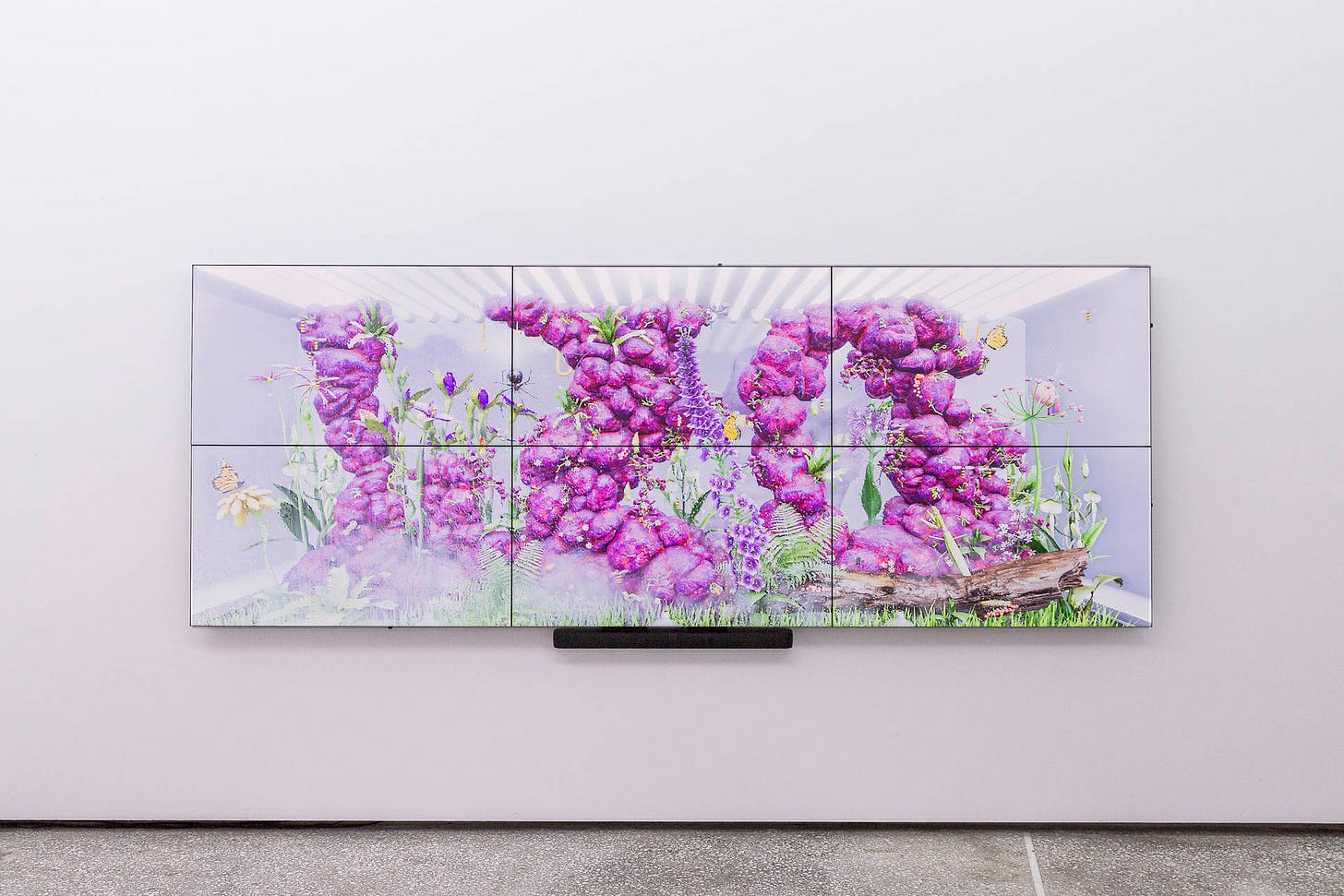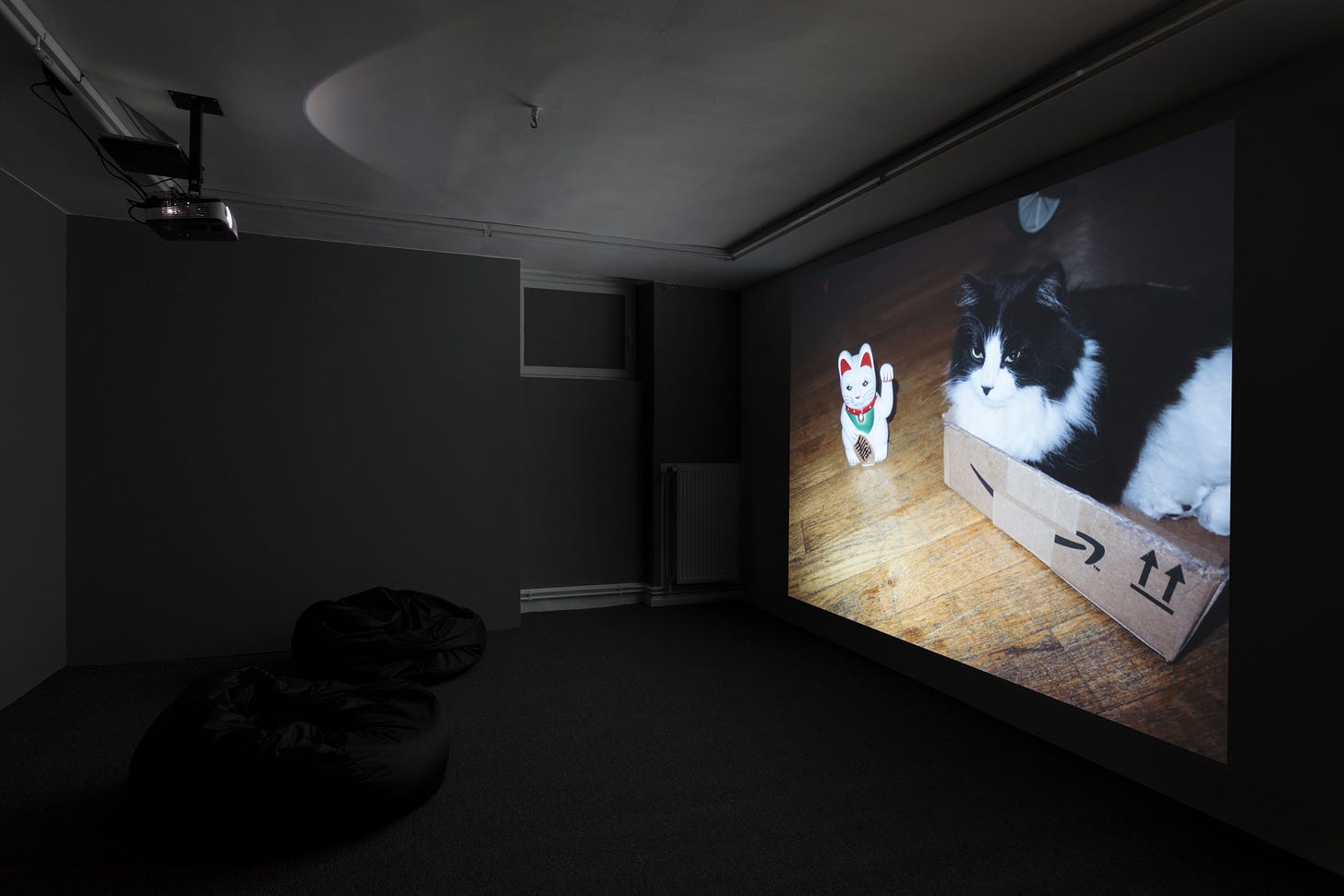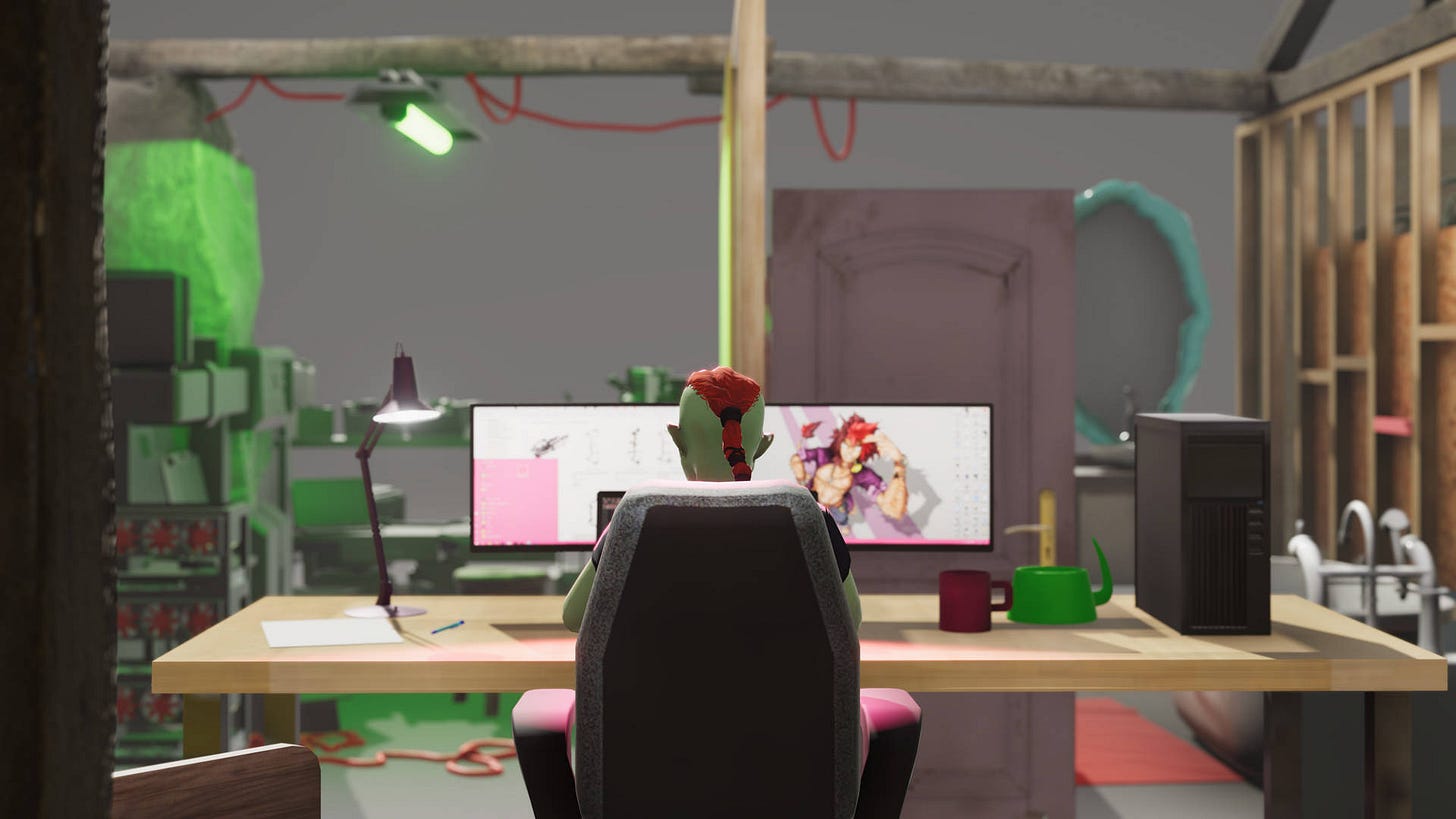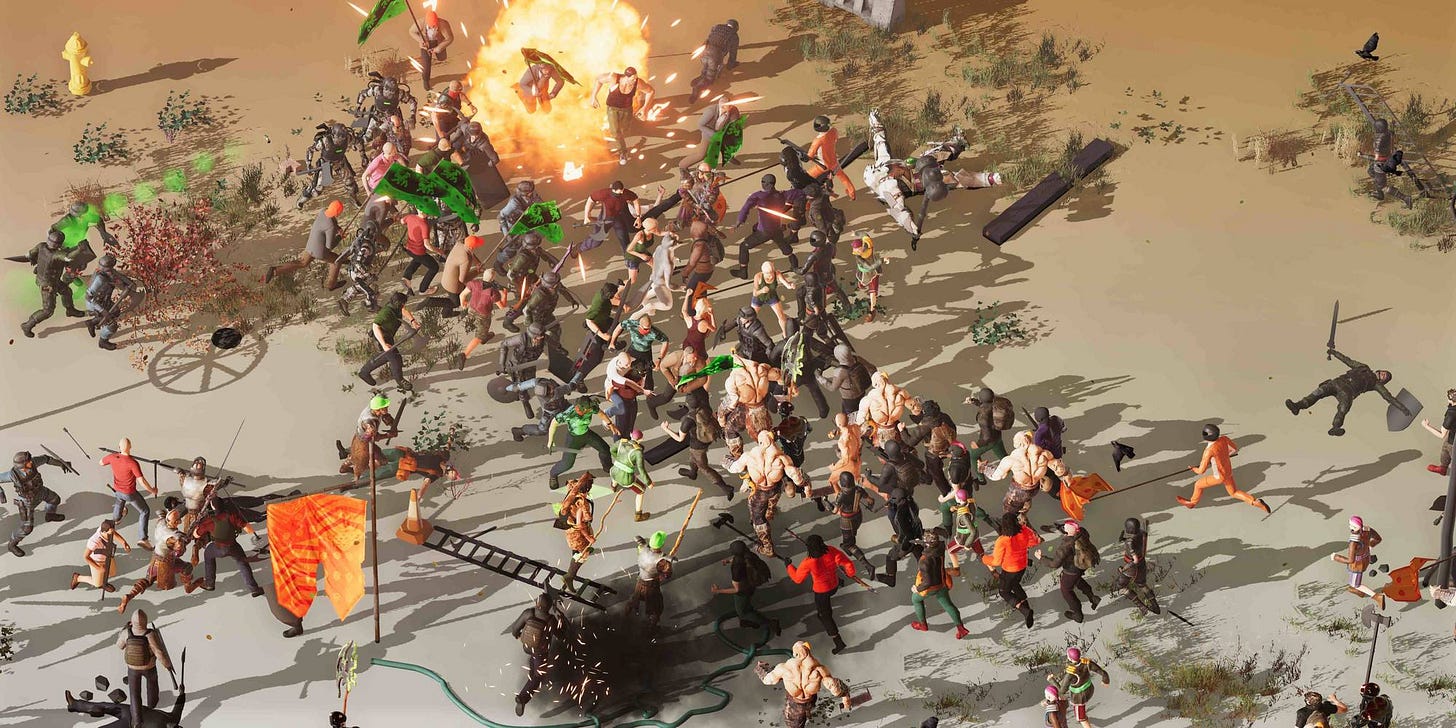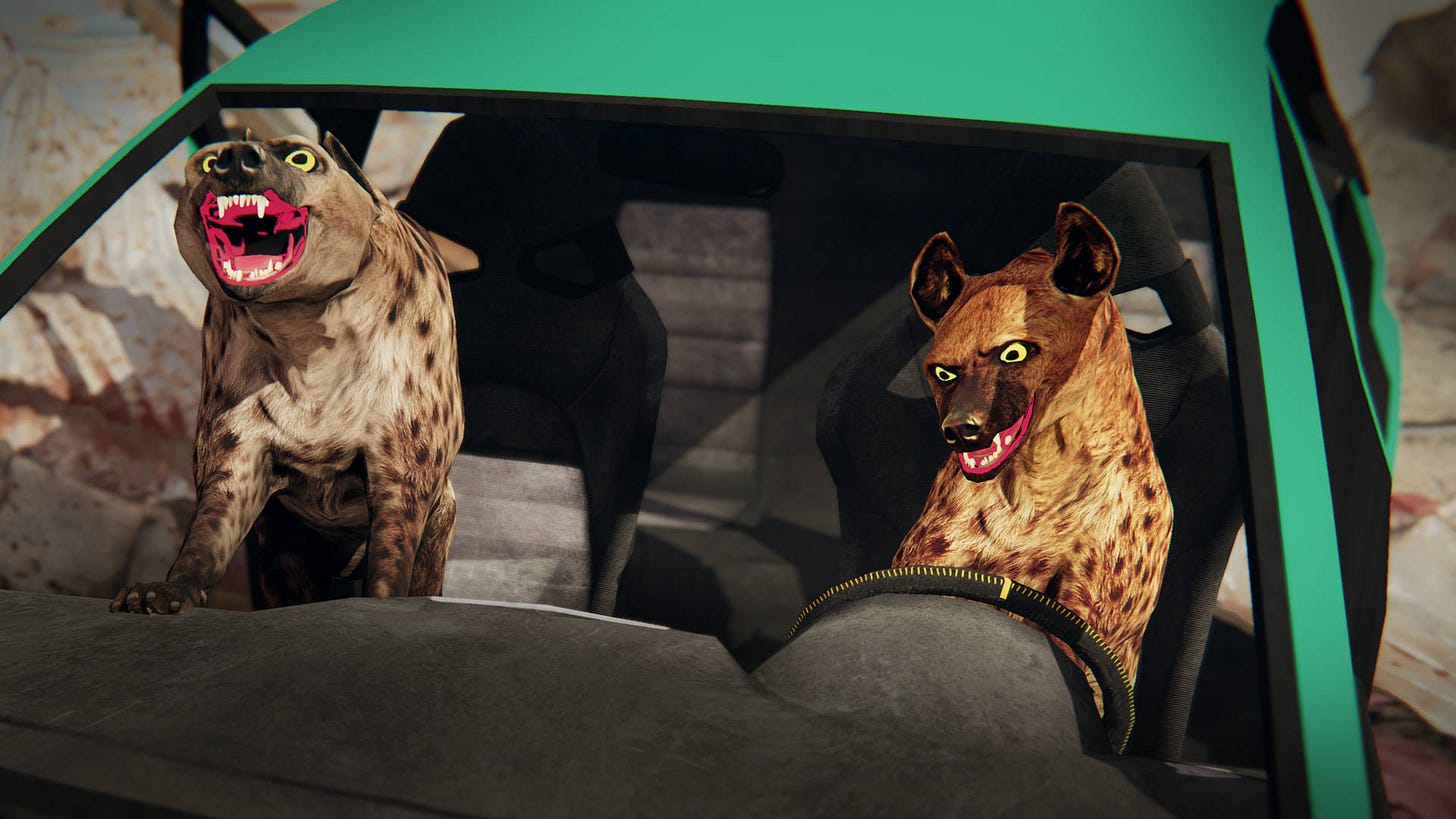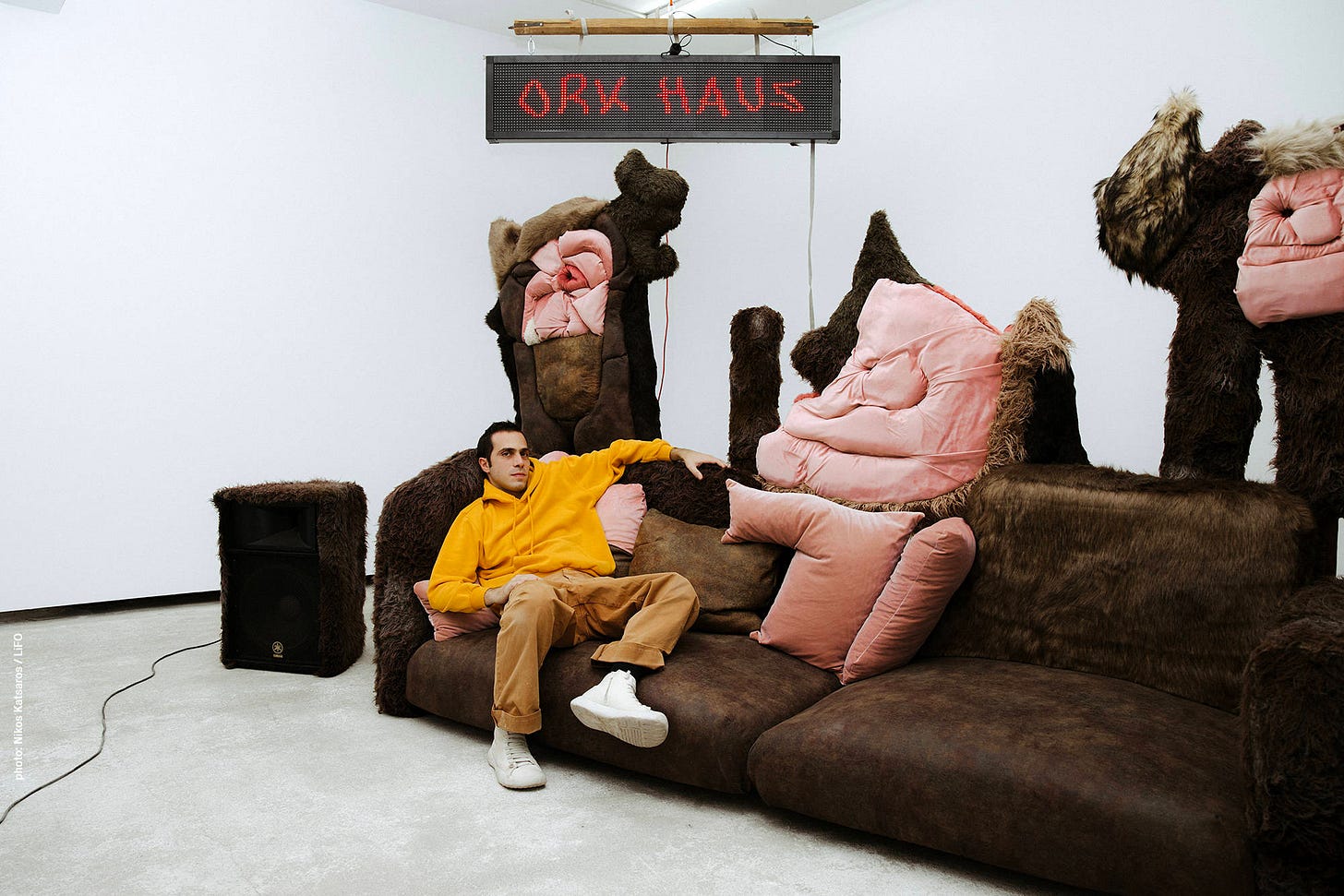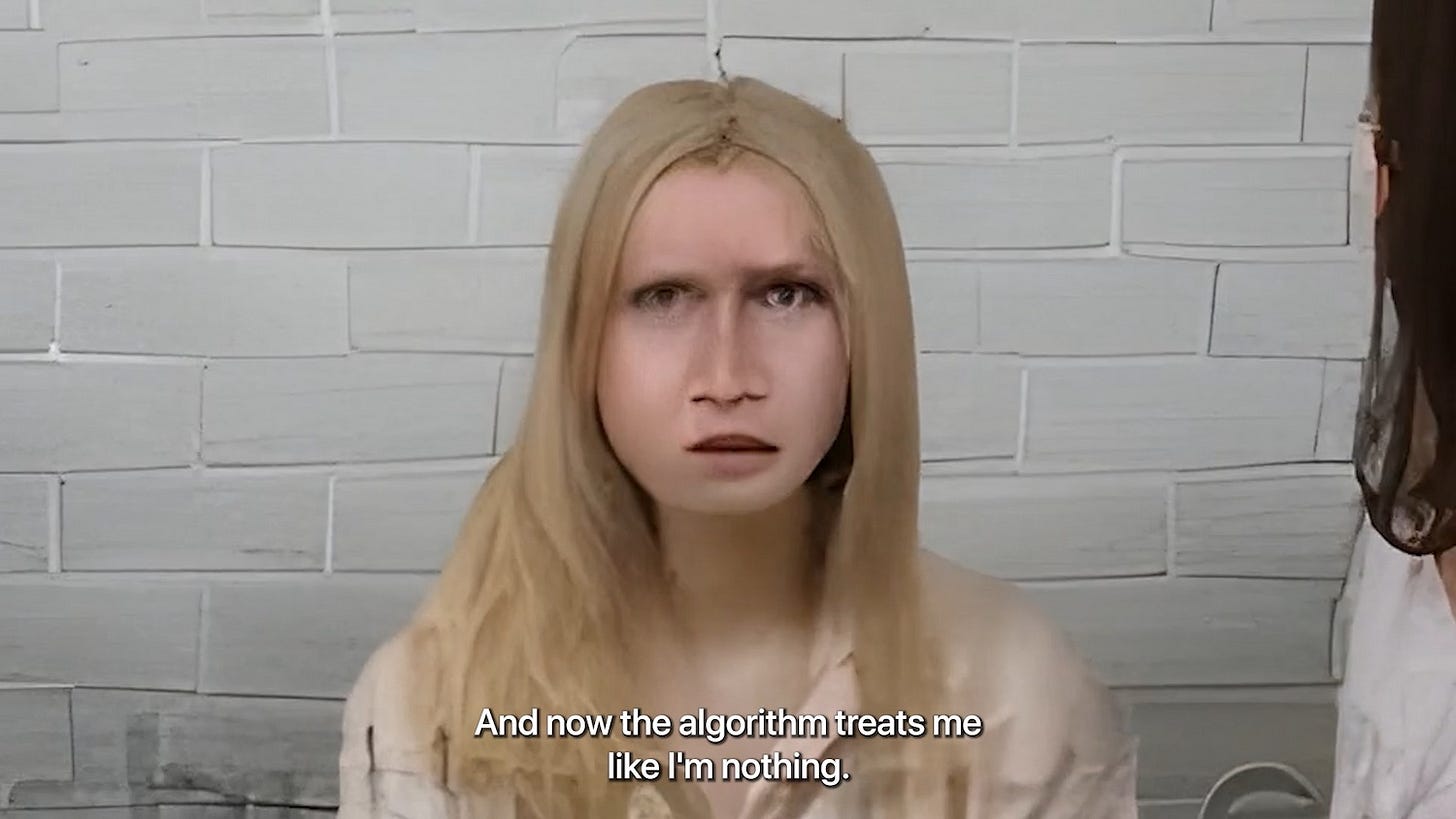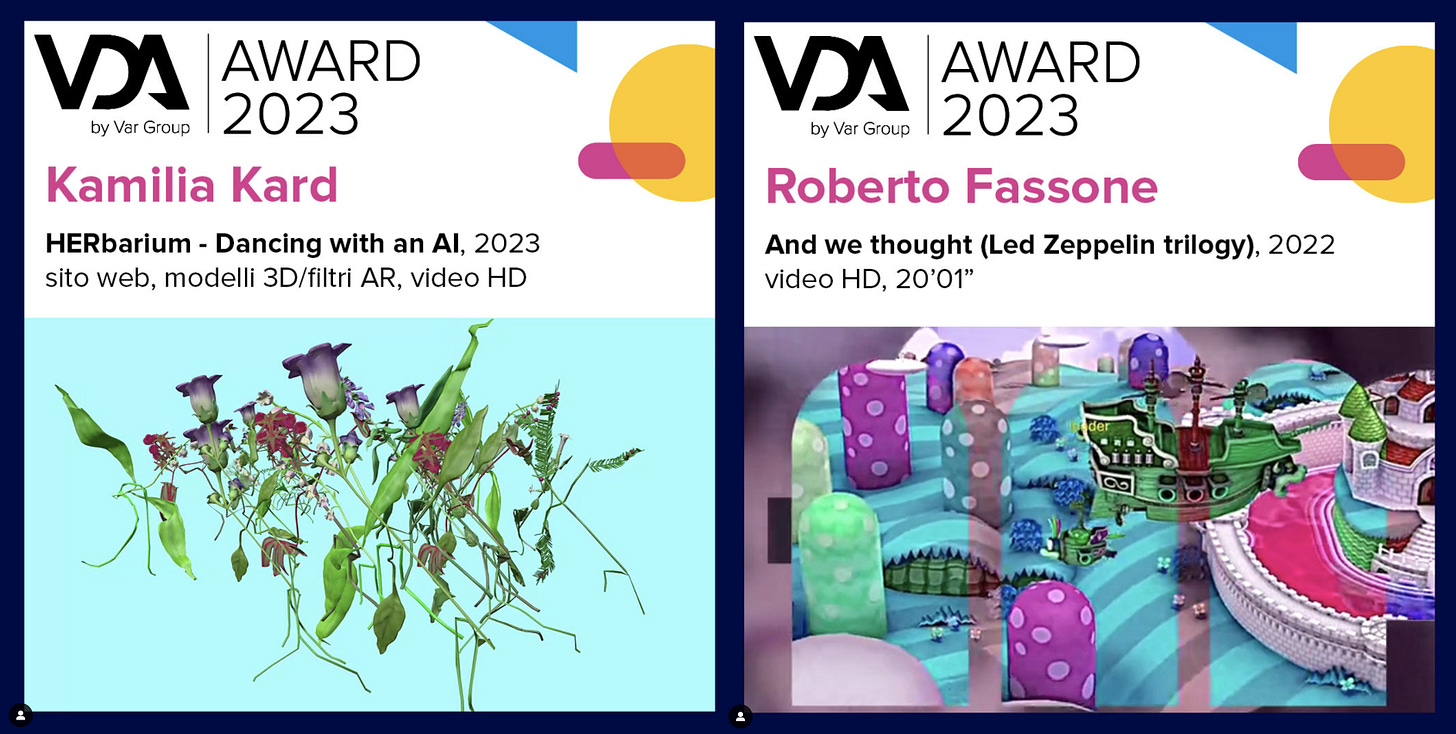Theo Triantafyllidis, BugSim (Pheromone Spa), 2022. Live Simulation. Ultra Widescreen Display, Gaming PC. Sound by Holly Waxwing. Image courtesy the artist
⊹˚. ♡.𖥔 ݁ ˖ I’m thrilled to announce two upcoming exhibitions that I’m curating, and that will come to life in the next few weeks. The first in row is a solo exhibition by Theo Triantafyllidis, an artist I wrote about recently, who painstakingly designs alternative worlds, that either work as a criticism to actual reality, and a portal to potential futures. The dream to collect these worlds into a single set-up is coming true thanks to Spazio Vitale, a newborn no-profit space in Verona, and an effort on researching whether a new, more balanced and harmonic, relationship between humans and technology is possible.
David Horvitz, Nostalgia (15,990), 2019. Digital projection of 15,990 digital photographs, 15,990 minutes, 9 February, 2019 – 6 April, 2019. Installation view of David Horvitz solo exhibition at ChertLüdde, 2019. Photo by Andrea Rossetti. Courtesy of The Artist and ChertLüdde, Berlin
The second exhibition is going to be called All These Fleeting Perfections / Tutte queste fugaci perfezioni, and to take place at Biblioteca Geisser in Turin, from October 27 to November 5, 2023. Produced by EXPOSED: Torino Foto Festival, in collaboration with Artissima and the active participation of some of the exhibiting galleries, All These Fleeting Perfections is a group show featuring a dream team of about 30 artists (spoiler above), and explores the post-photographic as a complex persistence of representation in images, of a way of relating to reality of which photography has been the sharpest expression. The “fleeting perfections” evoked by the title - borrowed from a short story by Italo Calvino - represent everything that, for a few moments along the XXth century, helped define the very essence of photography: ways of seeing that have been surpassed but never completely surmountable, still aspiring to their own incomparable absoluteness.
I leave more juicy news about All These Fleeting Perfections for the coming newsletter. Below you can find all you need to know to come and visit Theo Triantafyllidis: Sisyphean Cycles.
Theo Triantafyllidis, Ork Haus, 2022. Live Simulation, 4K Display, Gaming PC. Motion Capture Performance by Rachel Ho. Music by Daniel Burley & Gobby. Image courtesy the artist
Spazio Vitale
Via San Vitale 5 – Verona
October 13 – November 11, 2023
Monday through Friday, 2 p.m. – 7 p.m.; Saturday, 10 a.m. – 1 p.m. and 2 p.m. – 7 p.m.
Opening: October 13, 7 p.m.
₊‧°𐐪♡𐑂°‧₊ On the occasion of Art Verona 2023, Spazio Vitale opens to the public for the first time with Theo Triantafyllidis: Sisyphean Cycles (curated by Domenico Quaranta). The exhibition brings together, for the first time in a single set-up, four simulations by the Greek artist, guiding the viewer through an articulated and compelling narrative journey, and into as many ecosystems-worlds, programmed by the artist in such a way as to modify themselves according to autonomous behavior.
Significant examples of world building, a creative practice that is the subject of growing interest in both the artistic, philosophical and literary spheres, Theo Triantafyllidis’ live simulations are simulation software that bring to life immersive digital environments, sometimes automated, sometimes interactive, that can take various forms and adapt to different displays (from virtual reality to augmented reality to video installation); “in vitro simulations,” complete systems that the viewer can, from time to time, observe with scientific coolness or actively manipulate.
Triantafyllidis engages this medium both to critically narrate contemporary reality, highlighting the individual and social consequences of communication technologies on human beings; and to simulate alternative realities that start from radically different conditions.
More specifically, the exhibition presents four recent installations, ringed according to a narrative that proceeds from the critique of the present to the construction of alternative worlds: Ork Haus (2022), Radicalization Pipeline (2021), Ritual (2020) and BugSim (Pheromone Spa) (2022).
Ork Haus depicts a family of orks in their home environment, as they live a daily existence heavily conditioned by digital technologies, both at the level of interpersonal communication and at the level of household management and escape in simulations (video games, VR, streaming video). The ork, elsewhere used by the artist as his alter ego, is a recurring figure in his work, a narrative solution that allows him to reduce his characters to a set of elementary and thus paradigmatic drives and forms of communication. The protagonists of the simulation appear, each in their own way, imprisoned in their alternate realities, while the world around them seems to be falling apart.
Theo Triantafyllidis, Radicalization Pipeline, 2021. Live Simulation. Sound by Diego Navarro. Image courtesy the artist
In Radicalization Pipeline, two seemingly endless hordes clash into a violent free-for-all, swinging large melee weapons and shouting with distorted voices. A wide range of characters -from citizen militias to fantastical creatures -enter the screen only to kill each other, wave after wave, sinking their virtual bodies slowly into a muddy landscape. The mood occasionally lightens up by the medieval covers of familiar pop songs that complete the soundscape conceived by the composer and sound designer Diego Navarro. Looking at phenomena such as the rise of QAnon and the US Capitol attack, the artist suggests connections between gamification, fantasy, and political radicalization: the “funnel” structure of social media, which create discursive bubbles in which we are constantly exposed to like-minded people and to content that confirms our ideas, is analyzed in its political and social implications, emphasizing the role their “confirmation bias” takes in the emergence of cults, the circulation of fake news, and the process of political radicalization.
Theo Triantafyllidis, Ritual, 2020. Live Simulation. Image courtesy the artist
Instead, Ritual takes us to a seemingly familiar place – a readymade space appropriated and modified from a Game Engine demo – and to an unknown, post-apocalyptic time, in which human life, wiped out by a cataclysm, seems to have left behind only the ruins. In this situation, a nascent ecosystem made up of insects and animals gradually manifests its existence according to a repetitive and hypnotic rhythm, as if in some kind of strange ritual.
Theo Triantafyllidis, BugSim (Pheromone Spa), 2022. Live Simulation. Ultra Widescreen Display, Gaming PC. Sound by Holly Waxwing. Image courtesy the artist
Finally, BugSim (Pheromone Spa) welcomes us into a precious slice of microscopic life preserved in an intensive care terrarium. Through a moist glass surface and within lush vegetation expands a busy Colony of Ants. Slowly and painstakingly they are working to form a brittle purple mud into a structure they can call home. From this structure grows an entire forest of tiny flowering plants, calling to be pollinated by buzzing Honey Bee replicas and inhabited by a teeming microfauna. All but self-sustaining, this closed terrarium system is engineered to simulate all the necessary natural cycles for the fragile community of organisms: an experiment in resilience and entropy carefully monitored by a mysterious figure.
Born in Athens in 1988, Theo Triantafyllidis is an artist who works with digital and physical media to explore the experience of space and the mechanics of embodiment in hybrid realities. Utilizing algorithms and game engines, virtual reality headsets and experimental performance processes, he creates interactions within immersive environments. In Triantafyllidis’s worlds awkward interactions and precarious physics mingle with uncanny, absurd and poetic situations, inviting the viewer to engage with new realities.
Through the lens of monster theory, he investigates themes of isolation, sexuality and violence in their visceral extremities. He offers computational humor and AI improvisation as a response to the tech industry’s agenda. He tries to give back to the online and gaming communities that he considers both the inspiration and context for his work by remaining an active participant and contributor.
Theo holds an MFA from UCLA, Design Media Arts and a Diploma of Architecture from the National Technical University of Athens. He has shown work in museums, including House of electronic Arts in Basel, Hammer Museum in Los Angeles and NRW Forum in Dusseldorf and galleries such as Meredith Rosen Gallery, the Breeder and Eduardo Secci. He was part of the 2021 Athens Biennale: Eclipse, Berliner Festspiele 2021, Sundance New Frontier 2020 and Hyper Pavilion in the 2017 Venice Biennale.
Spazio Vitale is a place oriented to organize and host cultural activities marked by the investigation of the relationship between technology and humans. Contrary to the common understanding, our relationship with technology is not a simple user-tool relationship: as technology and digital forms of communication have taken over in our daily lives a series of functions, tasks and roles formerly exclusive to us, transforming the spheres of work and creativity, they opened up to a symbiosis where coexistence produces mutual benefit, but adaptation also generates suffering in the most sensitive part, the biological one, of the relationship.
Official sponsor of Spazio Vitale is VTENEXT, an Italian software house established in 2006 with offices in Verona, Milan and London, offering innovative and specific IT solutions for medium and large-sized companies. A benefit company, VTENEXT fully shares the soul and mission of Spazio Vitale.
Jonas Lund, The Future of Something, 2023. Still from video. 13’ 41’’. Courtesy the artist
⸜(。˃ ᵕ ˂ )⸝♡ Invited by Flash Art Italia, I penned some thoughts about the most recent iteration of the hype around Artificial Intelligence, and the need to demystify it. The text, in Italian, is available also online, check it out here!
( ꩜ ᯅ ꩜;) In other news, recently I have been involved in two “Digital Art” prizes. The MUSE - Digital Art Award by PPDS has an open call (deadline: October 20, 2023) and invites artists to submit contents for the Philips Tableaux, a display from PPDS using advanced colour ePaper technology to allow a power-free exhibition of the digital artworks. The device displays a stunning 60,000 colours and has a nice slideshow effect, which makes it ideal for static digital images and image slideshows. I will be in the jury together with Ilaria Bonacossa and Gabriela Galati.
The VAR Digital Art Award doesn’t have an open call, but invites a scientific committee of four to submit three candidates each. The four finalists are voted by the committee, but each member can only vote, of course, the other members’ nominee. As I’ve always been critical of the label “Digital Art”, I made a point to nominate artists that do not identify as “digital artists” - inter-disclipinary artists that address the digital medium as a tool, a distribution platform and/or a topic for specific projects. Two of my nominees - Roberto Fassone with his Led Zeppelin Trilogy (2022) and Kamilia Kard with her project HERbarium (2023) entered the final shortlist. The winner will be selected by another jury by the end of October.
ଘ(੭*ˊᵕˋ)੭* ੈ♡‧₊˚ 🟩⬜🟥 Sono entusiasta di annunciare due mostre che sto curando e che prenderanno vita nelle prossime settimane. La prima è una personale di Theo Triantafyllidis, un artista su cui ho scritto recentemente, che progetta minuziosamente mondi alternativi che funzionano sia come critica alla realtà attuale, sia come portale verso futuri potenziali. Il sogno di raccogliere questi mondi in un unico allestimento si sta realizzando grazie a Spazio Vitale, neonato spazio no-profit di Verona, dedicato alla ricerca di un nuovo rapporto, più equilibrato e armonico, tra uomo e tecnologia.
ʚ(。˃ ᵕ ˂ )ɞ La seconda mostra si chiamerà All These Fleeting Perfections / Tutte queste fugaci perfezioni e si terrà alla Biblioteca Geisser di Torino, dal 27 ottobre al 5 novembre 2023. Prodotta da EXPOSED: Torino Foto Festival, in collaborazione con Artissima e con la partecipazione attiva di alcune delle gallerie espositrici, All These Fleeting Perfections è una mostra collettiva che raccoglie circa 30 artisti, ed esplora la dimensione del post-fotografico come complessa persistenza della rappresentazione nelle immagini, di un modo di relazionarsi al reale di cui la fotografia è stata l’espressione più nitida. Le “fugaci perfezioni” evocate dal titolo rappresentano tutto ciò che, per qualche istante, ha contribuito a definire l’essenza stessa della fotografia: modi di vedere superati ma mai completamente superabili, ancora aspiranti a una propria incomparabile assolutezza.
Lascio alla prossima newsletter altri dettagli sulla mostra di Torino. Su Theo Triantafyllidis: Sisyphean Cycles, e sulle altre iniziative legate all’apertura di Spazio Vitale, trovate tutte le informazioni necessarie sul sito dello spazio.
‧₊˚❀༉‧₊˚. Su invito di Flash Art Italia, ho scritto alcune riflessioni sulla fase più recente dell’hype dell'Intelligenza Artificiale e sulla necessità di demistificarla. Il testo, in italiano, è disponibile sul numero estivo di Flash Art e online, seguendo questo link.
──★ ˙🍓 ̟ !! Cambiando argomento, recentemente sono stato coinvolto in due premi di “Digital Art”. Il MUSE - Digital Art Award by PPDS ha una open call (scadenza: 20 ottobre 2023) e invita gli artisti a presentare contenuti per il Philips Tableaux, un display di PPDS che utilizza un'avanzata tecnologia ePaper a colori per consentire l'esposizione di opere d'arte digitali senza consumo di energia. Il dispositivo visualizza ben 60.000 colori e ha un piacevole effetto slideshow, che lo rende ideale per immagini digitali statiche e presentazioni di immagini. Farò parte della giuria insieme a Ilaria Bonacossa e Gabriela Galati.
˖⁺‧₊˚ ♡ ˚₊‧⁺˖ Il VAR Digital Art Award non ha una open call, ma invita un comitato scientifico di quattro membri a presentare tre candidati ciascuno. I quattro finalisti vengono votati tra i 12 candidati dal comitato, ma ogni membro può votare, ovviamente, solo il candidato degli altri membri. Non avendo mai amato l'etichetta di “arte digitale”, mi sono impegnato a nominare artisti che non si identificano come “digital artist”: artisti interdisclipinari che affrontano il mezzo digitale come strumento, piattaforma di distribuzione e/o argomento per progetti specifici. Due dei miei candidati - Roberto Fassone con la sua Led Zeppelin Trilogy (2022) e Kamilia Kard con il progetto HERbarium (2023) - sono entrati nella rosa finale. Il vincitore sarà selezionato da un'altra giuria entro la fine di ottobre.




